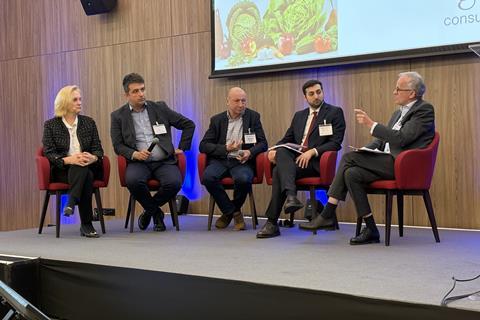Industry delegates at the ICOP conference in Hungary expressed concern over planned CAP reforms that will completely restructure funding for producer organisations, creating legal and economic uncertainty for ongoing programmes

The planned changes in the new CAP period from 2028 was a key talking point at the 19th International Conference for Producer Organisations for Fruit and Vegetables (ICOP).
The congress was held on 19-21 November 2025 near Budapest in Hungary, organised by Austrian consulting company GFA-Consulting in cooperation with its local Hungarian partner FruitVeB, welcoming 170 representatives from 15 European nations.
The first day of the conference focused on International trends and developments in the market.
Speakers including Cindy van Rijswick (Rabobank), Luc Vanoirbeek (Copa Cogeca), Ferenc Apáti (FruitVeB), Gergely Kóra from Spar Hungary and Nikki Hulzebos from the Dutch Fresh Produce Centre offered an overview of market developments from differing perspectives.
Presentations highlighted the paradox of the fruit and vegetable industry: In theory, the industry is the epitome of health, vitality and a positive image, but In practice fruit and vegetable consumption has declined steadily in recent years.
In other words, speakers noted, consumers are not doing what they say they will do or what they are told to do.
The industry must therefore commit itself to solving this problem in order to survive in the future.
During a presentation by European Commission spokesperson Kristine Bori on the second day of the event, massive changes to the subsidy regime for fruit and vegetables from 2028 onwards were announced.
These are set to completely overhaul the existing system for producer organisations and, from the industry’s point of view, pose a threat to the fruit and vegetable sector.
According to the European Commission’s plan, the funding provided by the Operational Programme – the most important support instrument for fruit and vegetables – will be structured and calculated in a completely different way.
The first and second pillars of the support regime are to be merged into a single fund in future, while co-financing by member states is being considered.
Transition periods, which are otherwise always possible between CAP periods, will be completely eliminated.
From 2028 onwards, everything will be handled according to the new rules.
This poses considerable difficulties for many in the industry in terms of meeting defined minimum requirements for ongoing funding programmes and financing multi-year projects, many of which extend well beyond 2027.
The result is massive legal and economic uncertainty regarding ongoing programmes and the new CAP period, delegates suggested.
”The Commission has spoken,” said Bori in response to what were described as the “emotional reactions” of the audience. “Now it’s up to you to respond.”
The other speakers on the second day were Márton Bittsánsky (Hungarian ministry), Lisa Martini (Areflh), Péter Kelemen (Medifruct) and Philippe Appeltans (BelOrta), as well as Sándor Nagypéter from Hungary’s largest producer organisation, Délalföldi Kertészek Szövetkezete.
Wolfgang Harreither from this year’s main sponsor Valibiotics and Siegfried Rappel (EOS), Matthias Nachtmann (Friends of Digital Farming), Benedikt Pircher (Metos), Ton van Dalen (Oxin Growers) and Gregor Witzmann (Farm-ING) then offered insights into smart solutions for future-oriented, economically and ecologically sound agriculture.
Day 3 of the conference was divided into three field trips focusing on fruit, vegetables and mushrooms.
In his closing remarks at the conference, GFA-Consulting managing director Wolfgang Braunstein emphasised that the fruit and vegetable industry is a flexible one that has already overcome many challenges.
However, given the many uncertainties about what actually lies ahead, the sector is unsettled and needs answers, he noted.
”We are in a position to survive the announced changes and adapt,” he said. “But we need to know what actually awaits us and what the framework conditions will be like in order to be able to react accordingly.”
The 20th anniversary edition of the ICOP conference will take place in Austria on 18-20 November 2026.



